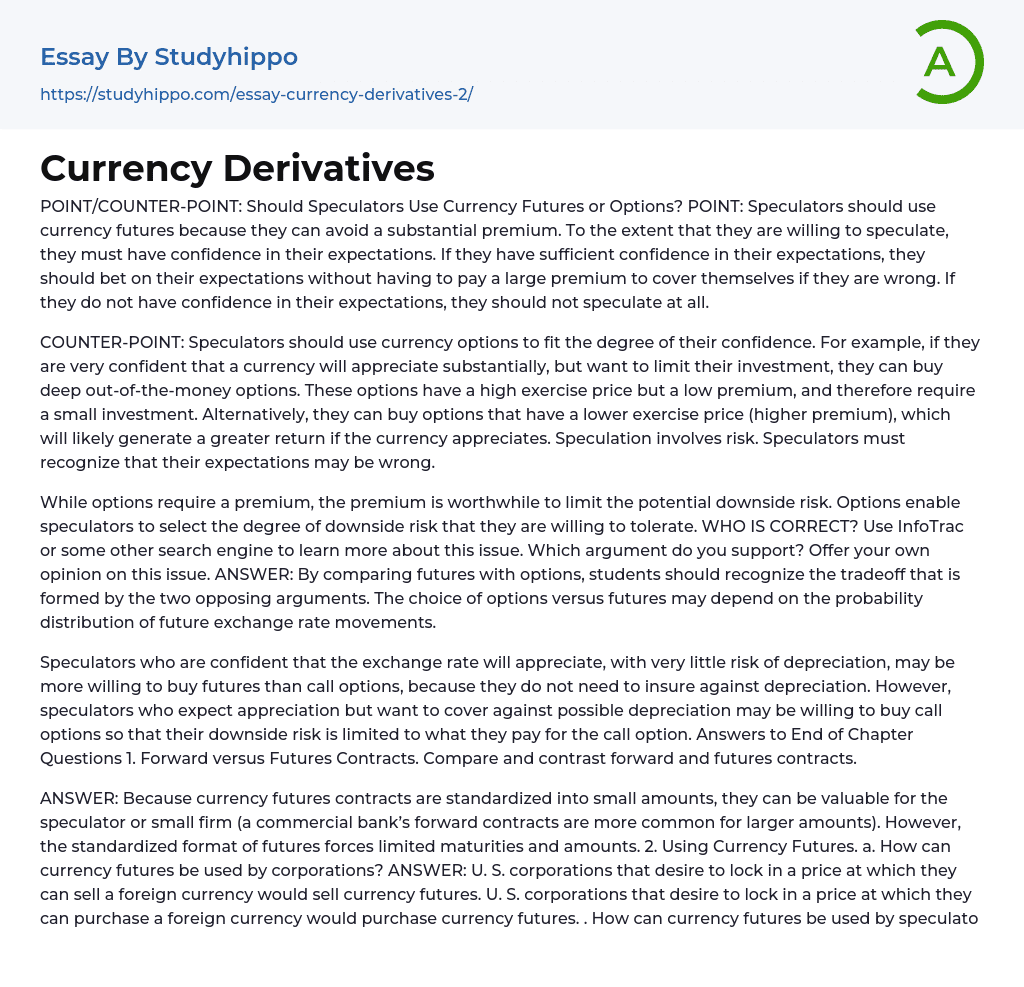POINT/COUNTER-POINT:
Speculators should use currency futures because they can avoid a substantial premium. To the extent that they are willing to speculate, they must have confidence in their expectations. If they have sufficient confidence in their expectations, they should bet on their expectations without having to pay a large premium to cover themselves if they are wrong. If they do not have confidence in their expectations, they should not speculate at all.
COUNTER-POINT:
Speculators should use currency options to fit the degree of their confidence. For example, if they are very confident that a currency will appreciate substantially, but want to limit their investment, they can buy deep out-of-the-money options. These options have a high exercise price but a low premium, and therefore require a small investment. Alternatively, they can buy options tha
...t have a lower exercise price (higher premium), which will likely generate a greater return if the currency appreciates. Speculation involves risk. Speculators must recognize that their expectations may be wrong.
While options require a premium, the premium is worthwhile to limit the potential downside risk. Options enable speculators to select the degree of downside risk that they are willing to tolerate. Use InfoTrac or some other search engine to learn more about this issue. Which argument do you support? Offer your own opinion on this issue.
ANSWER:
By comparing futures with options, students should recognize the tradeoff that is formed by the two opposing arguments. The choice of options versus futures may depend on the probability distribution of future exchange rate movements.
Speculators who are confident that the exchange rate will appreciate, wit
very little risk of depreciation, may be more willing to buy futures than call options, because they do not need to insure against depreciation. However, speculators who expect appreciation but want to cover against possible depreciation may be willing to buy call options so that their downside risk is limited to what they pay for the call option. Answers to End of Chapter Questions 1. Forward versus Futures Contracts. Compare and contrast forward and futures contracts.
ANSWER:
Because currency futures contracts are standardized into small amounts, they can be valuable for the speculator or small firm (a commercial bank’s forward contracts are more common for larger amounts). However, the standardized format of futures forces limited maturities and amounts. Using Currency Futures. a. How can currency futures be used by corporations?
ANSWER:
U. S. corporations that desire to lock in a price at which they can sell a foreign currency would sell currency futures. U. S. corporations that desire to lock in a price at which they can purchase a foreign currency would purchase currency futures. . How can currency futures be used by speculators?
ANSWER:
Speculators who expect a currency to appreciate could purchase currency futures contracts for that currency. Speculators who expect a currency to depreciate could sell currency futures contracts for that currency. Currency Options. Differentiate between a currency call option and a currency put option.
ANSWER:
A currency call option provides the right to purchase a specified currency at a specified price within a specified period of time. A currency put option provides the right to sell a specified currency for a specified price
within a specified period of time. . Forward Premium. Compute the forward discount or premium for the Mexican peso whose 90-day forward rate is $. 102 and spot rate is $. 10. State whether your answer is a discount or premium. ANSWER: (F - S) / S =($. 098 - $. 10) / $. 10 ? (360/90) = –. 02, or –2%, which reflects a 8% discount 5. Effects of a Forward Contract. How can a forward contract backfire?
ANSWER:
If the spot rate of the foreign currency at the time of the transaction is worth less than the forward rate that was negotiated, or is worth more than the forward rate that was negotiated, the forward contract has backfired.
Hedging With Currency Options. When would a U. S. firm consider purchasing a call option on euros for hedging? When would a U. S. firm consider purchasing a put option on euros for hedging? ANSWER: A call option can hedge a firm’s future payables denominated in euros. It effectively locks in the maximum price to be paid for euros. A put option on euros can hedge a U. S. firm’s future receivables denominated in euros. It effectively locks in the minimum price at which it can exchange euros received. 7. Speculating With Currency Options. When should a speculator purchase a call option on Australian dollars?
- Absolutism essays
- Appeal essays
- Bourgeoisie essays
- Contras essays
- Corporate Governance essays
- Corruption essays
- Democracy essays
- Democratic Party essays
- Developed Country essays
- Dictatorship essays
- Elections essays
- European Union essays
- Federalism essays
- Foreign essays
- Foreign policy essays
- Gentrification essays
- Hillary Clinton essays
- Income Tax essays
- International Relations essays
- John Marshall essays
- John Stuart Mill essays
- Left-Wing Politics essays
- Liberty essays
- Military essays
- Monarch essays
- Monarchy essays
- Political Corruption essays
- Political Party essays
- Political Science essays
- President Of The United States essays
- Public Service essays
- Red Cross essays
- Reform essays
- Republic essays
- Revenge essays
- Social Security essays
- Sovereign State essays
- State essays
- Supply essays
- Terrorism essays
- United Nations essays
- World Trade Organization essays
- Futures Contract essays
- Mortgage Loan essays
- Renting essays
- Transaction Cost essays
- Asset essays
- Capital market essays
- Day Trading essays
- Depreciation essays




